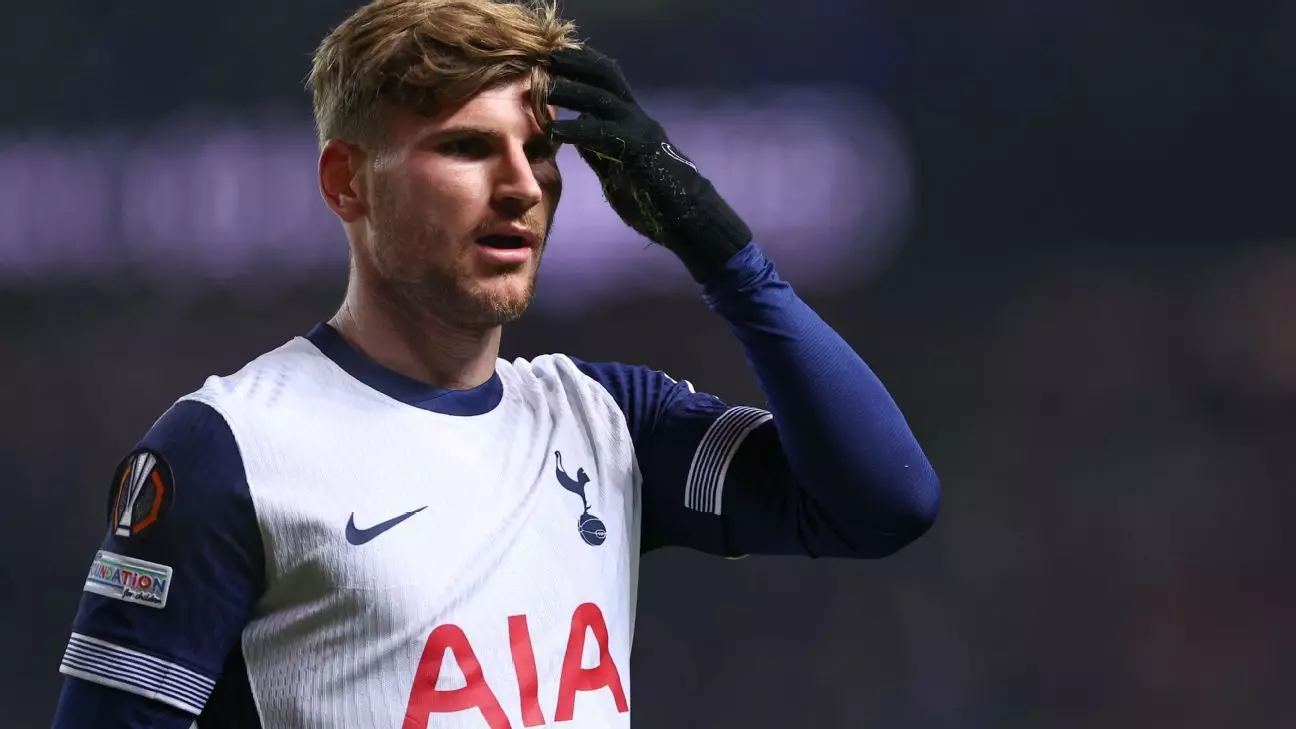The landscape of football is often dictated by the dynamics between players and coaching staff, and nowhere is this more palpable than in the current narrative surrounding Tottenham Hotspur under head coach Ange Postecoglou. Following a lackluster performance against Rangers in the Europa League, where the game ended in a 1-1 draw, the focus has shifted heavily to Timo Werner’s performance—a senior player whose role has come under significant scrutiny.
Postecoglou, known for his candid assessments, did not mince words regarding Werner, describing his first-half display as “not acceptable.” This critique arises in a context where Tottenham is grappling with numerous injuries, leaving the squad depleted. The juxtaposition of a young talent like Archie Gray earning praise for his contributions against a struggling Werner illuminates a broader issue: the expectations and responsibilities on senior players in critical moments. Postecoglou’s approach highlights a need for seasoned players, especially those with an illustrious background—like Werner, a Germany international with Champions League experience—to step up during trying times.
The coach articulated a crucial point: with a limited roster, the players expected to lead must elevate their standards. This sentiment reflects a growing concern about accountability in a team that has seen its fortunes dip. The pressure to perform under these circumstances is immense, and senior players are often viewed as the backbone of a squad, expected not only to perform brilliantly but also to guide younger teammates through challenging experiences.
Postecoglou’s philosophy seems to advocate for a culture of accountability and robust application among all players. His pointed remarks about Werner were framed not as mere criticism but as an essential evaluation of his performance. This distinction is vital in professional sports, particularly in environments as competitive as the Premier League. The coach emphasized the need for a collective mindset, particularly when injuries leave scant resources. Without a unified front, the chances of success significantly diminish.
Moreover, Postecoglou’s insistence that he will not coddle players whose egos may be bruised indicates a shift in culture at Tottenham. This is a departure from previous managerial strategies that sometimes prioritized player sentiments over team performance. By focusing on results and the immediate need for collective effort, Postecoglou is pushing for a more resilient mentality, challenging players to rise above personal grievances for the greater good of the team.
The Struggles of Away Performances
Despite the team’s turbulent trajectory, Postecoglou remains resolute about his attacking style of play. In response to questions regarding the apparent difficulty of implementing this style away from home, he firmly asserted that intent is key. His philosophy—that every game should be approached with a winning mindset—reveals a commitment to an aggressive style of play that does not shy away from risk.
Critics often point to the challenges of executing attacking football in hostile environments, yet Postecoglou’s refusal to alter his philosophy indicates confidence in his approach. He argues against the fear-based mindset of merely trying not to lose, which can often lead to stagnation rather than progression. This philosophy, however, requires absolute buy-in from every player—something that becomes critical when the team is underperforming.
Looking Ahead: Challenges and Opportunities
Tottenham’s current league positioning is a stark reminder of the challenges they face. Ranked 11th and seven points off the top four, the need for a strategic upturn is urgent. The upcoming match against bottom-of-the-table Southampton may offer an opportunity to realign their season’s objectives, but anything less than a comprehensive victory could exacerbate existing tensions.
In a time of adversity, the trust placed in senior players like Werner will be tested. The coach’s unyielding stance may either galvanize the team into a better performance or lead to further discord. The next steps for both Postecoglou and his players are crucial—not just for immediate results, but for instilling a renewed sense of belief and cohesion within the squad. The narrative surrounding Tottenham is still being written, but one thing is clear: the road ahead requires unity, resilience, and a commitment to improved performances from every player.
The interplay of coaching philosophy, player performance, and the cultural shift within Tottenham embodies the complexities of modern football. As Postecoglou navigates these challenges, the answers may well shape the club’s future ambitions and success. Ultimately, the saga of Timo Werner’s role in this evolving narrative will be an intriguing subplot as Tottenham seeks to rebound from its recent struggles.

